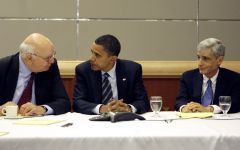Posted on November 7th, 2008 at 12:50 pm by Steve
 Let me preface this post by explaining my reason for posting it. It is not to condemn Obama, or to criticize those of us who voted for him (as, in fact, I did). It is to remind us that the real work of influencing policy decisions is ongoing, and to shine a bright light on the choices that Obama and his advisers are making. I am heartened by the fact that Obama is intelligent, reasonable, educated, and engaged with the world – indeed, it is for those very reasons that I believe he may be amenable to progressive influences. But we must be those influences.
Let me preface this post by explaining my reason for posting it. It is not to condemn Obama, or to criticize those of us who voted for him (as, in fact, I did). It is to remind us that the real work of influencing policy decisions is ongoing, and to shine a bright light on the choices that Obama and his advisers are making. I am heartened by the fact that Obama is intelligent, reasonable, educated, and engaged with the world – indeed, it is for those very reasons that I believe he may be amenable to progressive influences. But we must be those influences.
So… the Obama team announced the formation of their Transition Economic Advisory Board:
The Transition Economic Advisory Board will help guide the work of the Obama-Biden transition team in developing a strong set of policies to respond to the economic crisis. The Board includes:
- David Bonior (Member House of Representatives 1977-2003)
- Warren Buffett (Chairman and CEO, Berkshire Hathaway)-will participate via speakerphone
- Roel Campos (former SEC Commissioner)
- William Daley (Chairman of the Midwest, JP Morgan Chase; Former Secretary, U.S. Dept of Commerce, 1997-2000)
- William Donaldson (Former Chairman of the SEC 2003-2005)
- Roger Ferguson (President and CEO, TIAA-CREF and former Vice Chairman of the Board of Governors of the Federal Reserve)
- Jennifer Granholm (Governor, State of Michigan)
- Anne Mulcahy (Chairman and CEO, Xerox)
- Richard Parsons (Chairman of the Board, Time Warner)
- Penny Pritzker (CEO, Classic Residence by Hyatt)
- Robert Reich (University of California, Berkeley; Former Secretary, U.S. Dept of Labor, 1993-1997)
- Robert Rubin (Chairman and Director of the Executive Committee, Citigroup; Former Secretary, U.S. Dept of Treasury, 1995-1999)
- Eric Schmidt (Chairman and CEO, Google)
- Lawrence Summers (Harvard University; Managing Director, D.E. Shaw; Former Secretary, U.S. Dept of Treasury, 1999-2001)
- Laura Tyson (Haas School of Business, University of California, Berkeley; Former Chairman, National Economic Council, 1995-1996; Former Chairman, President’s Council of Economic Advisors, 1993-1995)
- Antonio Villaraigosa (Mayor, City of Los Angeles)
- Paul Volcker (Former Chairman, U.S. Federal Reserve 1979-1987)
Let’s review: 17 members. Eight captains of finance and industry, including three former federal officials. Seven more former federal government officials. One governor of a midwestern state. One mayor of a large city. No representatives of labor unions. No representatives of non-governmental, non-financial entities. No academics without deep ties to the federal government. No one to represent the voices of the poor, the marginalized, the disenfranchised.
And now recall the Chomsky excerpt, posted below:
The domestic sources of power remain basically unchanged, whatever the electoral outcome. The major decision-making positions in the executive branch of the government, which increasingly dominates domestic and foreign policy, remain overwhelmingly in the hands of representatives of major corporations and the few law firms that cater primarily to corporate interests… It is hardly surprising, then, that the basic function of the State remains the regulation of domestic and international affairs in the interest of the masters of the private economy, a fact studiously ignored in the press and academic scholarship, but apparent on investigation of the actual design and execution of policy over many years.
We’ve got our work cut out for us.